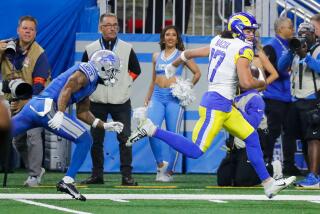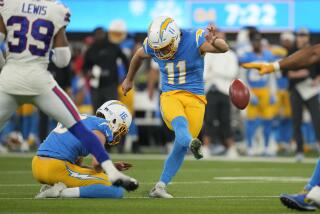SUPER BOWL XXVII : He Makes, Not Scores, the Points
- Share via
Super Bowl XXVII is a duel between Jim Kelly and Troy Aikman or Thurman Thomas and Emmitt Smith to see who can score the most touchdowns, right?
Not exactly. First, we have to see how many touchdowns Jim Ritcher can manufacture.
Jim Ritcher? You never heard of him, right? But he’s been in the business of making touchdowns for the Buffalo Bills since 1980. He’s been in on more touchdowns for the Bills than any other player, simply because he has played in more games--204--than any player in team history. He has had a hand in the making of touchdowns when Joe Ferguson was quarterback and Joe Cribbs was the rusher. His teammates like to ask him how Jack Kemp was to block for and if Red Grange could go to his left.
Don’t expect to see his name in any headlines Sunday. If the Bills win, don’t look for a streamer reading, “Ritcher Leads Bills to Victory.” Even though it just might be true.
You won’t even know he played unless you get a starting lineup card. Sometimes his name gets messed up. He’s either “Ritchey” or “Richter.” He’d be better off as John Smith.
He’s used to it. Ritcher belongs to that forlorn crew, the French Foreign Legion or the Lost Battalion of sport. He is that Unknown Soldier of football, the offensive lineman.
It is the notion here that Judge Crater didn’t disappear. He became an offensive lineman. Amelia Earhart could not disappear any more thoroughly than a guy who takes up a three-point stance alongside the center on a football line.
It is a perfect hideout. No one could ever find you there. A spy would envy the anonymity a pulling guard gets.
When you look at an offensive line, you get a mental picture of a palatial ocean liner. The people dancing and wassailing up in the main lounge have no idea about the guys down in the engine room with coal and sweat mingling on their brows as they shovel into furnaces. The offensive line is the engine room gang. Without them, the ship isn’t going anywhere, but the captain gets all the braid on his hat.
They’re the real Secret Service of the game. They’re hired to protect the chief executive, the quarterback, even if it means giving up their own selves. When he gets sacked, they have a whole lot of explaining to do.
Jim Kelly is a fine broth of a lad. He has this great arm, this sure touch. He completed 269 passes this regular season for 23 touchdowns. He got sacked 20 times. If Jim Ritcher doesn’t do his job, Kelly spends the season in bed. He ends it in traction, not a Super Bowl.
That’s the only way to measure an offensive lineman--by failure. He has no positive statistics to offer the historians--or the contract-renewal negotiator. The defense gets tackles, assisted tackles, interceptions, knockdowns, game-saving tackles, blocked kicks, hurrying-the-passers. The rest of the offense gets touchdowns, yards gained, completions, field goals, first downs--all manner of recognition.
An offensive guard’s neighbors must wonder what he does for a living. They probably peek through the curtains when he leaves the house and debate whether to tip the police. If he says he played professional football for 12 years, they get suspicious. “How come I never heard of you? Who did you play for--Canada?” An offensive lineman must have trouble getting credit or cashing checks. “Guy here says he’s played in three Super Bowls for the Buffalo Bills. Want me to hold him here till you get the cops?”
Even in basketball and hockey, they give assists. The offensive lineman gets nothing. He never even gets to see the football. It’s just an unidentified flying object to him. In the Raider game this year, a blocked pass fell into Jim Ritcher’s arms. He didn’t know what to do with it. Chances are, he didn’t know what it was. Interior offensive linemen are the only parties on the field who are ineligible to catch a football directly from a quarterback.
They spend their lives getting smashed into by homicidal tackles and linebackers frothing at the mouth. They never really see the game. They have to listen for it. The roar of the crowd tells them what happened.
Ritcher has been blunting pass rushes and leading sweeps for the Bills since 1980. He had been an Outland Trophy winner--as the outstanding college lineman--at North Carolina State when he was drafted No.1 by the Bills.
Pass blocking was a mystery to him. “We ran the Veer at N.C. State,” he said. “What did I know about pocket passing?”
He learned. Interior linemen are the master mechanics of the sport. Cabinetmakers. Artisans. They have to be unemotional, methodical, persistent, dependable, not spectacular. They never get to exchange high-fives or do dances in the end zone. They merely get to slug it out with 300-pound adversaries at the line of scrimmage like woolly mammoths in a tar pit. They are the infantry of the pro game. They spend their lives in no- man’s land.
Around them, their teammates are getting oohs and aahs and ecstatic cheers from delirious fans, while they stand there with their nose dripping blood where the helmet got knocked sideways into it.
Afterward, the quarterback or running back or wide receiver is surrounded in the locker room by an adoring press. The offensive lineman dresses quickly and stops the bleeding and politely asks the overflow if they can kindly part so he can get at his locker and go home.
But offenses would have no locker room celebrations if the pass rush finds it has an open highway to the quarterback or a cornerback is standing there waiting for a ballcarrier behind the line every time.
They are as taken for granted as the football. So, where’s the payoff for these silent servants of football, the butlers of the NFL? “Oh,” says Jim Ritcher, “every time a Thurman Thomas gets recognition, or has a 214-yard rushing game, or Jim Kelly has a league-leading quarterback rating of 97.6, we feel we’re a big part of that success. We feel that a percentage of that touchdown belongs to us.”
In other words, Kelly had a hand in 24 of the 44 touchdowns Buffalo scored this year, and Thurman Thomas got 12. But Jim Ritcher--and his unsung cohorts, Wil Wohlford, Kent Hull and “House” Ballard--had a hand in all of 44 of them (save, perhaps, the two scored on interception returns and the one scored on a fumble recovery).
So, if the guys in Rotary one day want to know what Jim Ritcher did with the Bills in his career, he can answer in all honesty: “Well, in a way, I was the leading scorer.”
More to Read
Go beyond the scoreboard
Get the latest on L.A.'s teams in the daily Sports Report newsletter.
You may occasionally receive promotional content from the Los Angeles Times.










